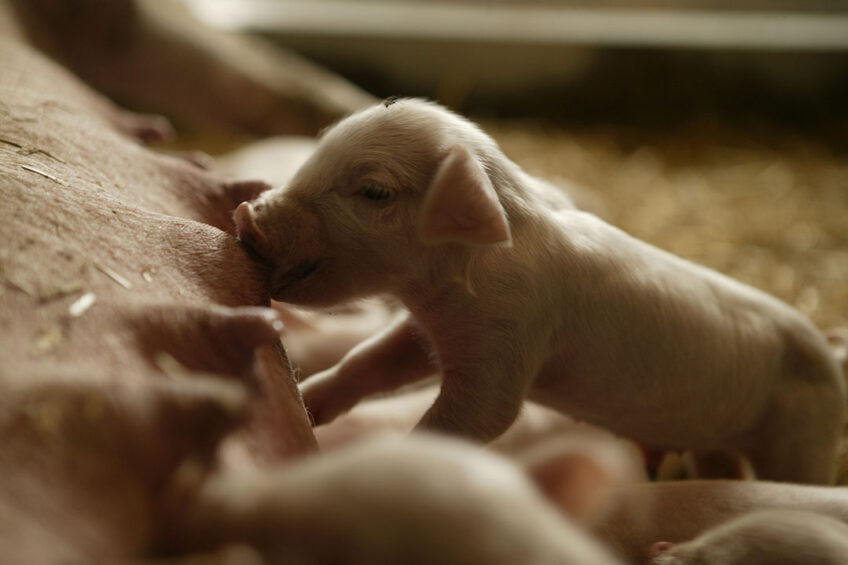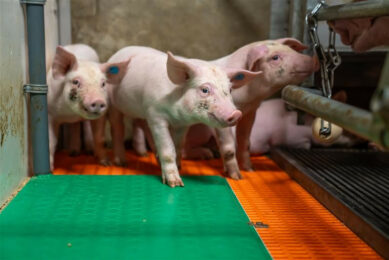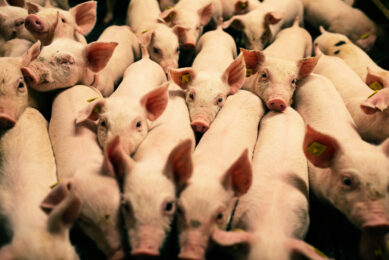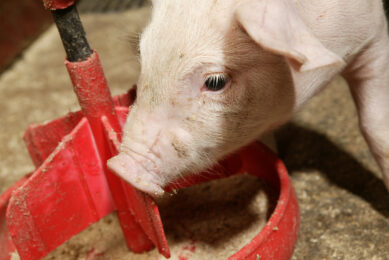Monosodium glutamate enhances the growth of suckling piglets

A new study demonstrates how the addition of monosodium glutamate promotes the health and growth of piglets through its beneficial effects on the milk production of lactating sows.
In primiparous sows, limited feed intake and inadequate blood flow to lactating mammary glands result in a reduced provision of nutrients to the mammary gland for the synthesis of components of milk. Studies show that sow’s milk does not provide adequate amino acids (AAs) needed for the maximal growth of piglets. Although glutamate has been traditionally regarded as a nutritionally non-essential AA for mammals, emerging evidence shows that a typical corn- and soybean meal-based diet may not provide sufficient glutamate to support maximum protein synthesis in growing pigs. The researchers of this study investigated how increasing dietary content of glutamate through addition of monosodium glutamate (MSG) enhances milk production of lactating sows and the growth of piglets. 30 multiparous sows (Landrace × Large White) were assigned randomly into 1 of 3 dietary groups:
control (a corn- and soybean meal-based diet),
basal diet + 1% MSG, and
basal diet + 2% MSG. Weight and milk consumption of piglets were measured during a 29-day lactation period and blood samples obtained from sows and piglets to measure health indicators.
Improved piglet growth performance
In this study, the milk intake of piglets was 14% and 25% higher for the 1% and 2% MSG groups, respectively. Average daily weight gains of piglets from sows fed the MSG-supplemented diet were greater throughout the 29-day lactation period, compared to piglets from control-fed sows. Piglets in the 1% and 2% MSG groups had 27% and 42% greater weight gains than piglets in the control group. Of note, rates of preweaning mortality for piglets in 1% and 2% MSG groups were 4.4% and 3.3%, respectively, compared to the 16.7% preweaning mortality for piglets nursed by control sows.
The weight gain of piglets is positively correlated with increased volume and nutrient content of milk. The increase in milk consumption and the growth of piglets indicated the greater production of milk by lactating sows. The researchers commented that improved nutritional status of piglets can enhance their antioxidative capacity, as well as their digestive and immune functions, thereby reducing the rate of preweaning mortality and the plasma concentration of TBARS (thiobarbituric acid reactive substances) observed in this study. They added that MSG reduced the loss of body weight in sows, but the voluntary feed intake of sows was not affected suggesting that the increased concentrations of free and protein-bound AAs in milk (observed in this study) likely result from an increased efficiency of the use of dietary nutrients for protein synthesis by MSG-supplemented sows.
Enhanced milk composition
The results of this study indicate that supplementing sows with up to 2% MSG increases milk yield and the concentrations of total AAs and other nutrients (carbohydrates, CP, and fat) in milk, leading to improved growth performance and the survival of piglets. Concentrations of many free AAs in sow’s milk, including alanine, arginine, aspartate, asparagine, citrulline, glutamate, glutamine, BCAAs, and proline, were higher in MSG-supplemented sows, compared to the control group, with values being the greatest for the 2% MSG group. Similarly, the concentrations of all protein-bound AAs were greater in the milk of MSG-supplemented sows. The researchers commented that the uptake of AAs by the lactating gland is positively correlated with their concentrations in the arterial blood. Thus, dietary supplementation with MSG, which increases the concentrations of glutamate in the maternal plasma, augments the availability of glutamate for the synthesis of glutamine, alanine, aspartate, asparagine, and protein in mammary epithelial cells – helping to explain how dietary supplementation with MSG enhanced concentrations of protein in sow’s milk in this study.
Plasma amino acids and metabolites
MSG supplementation to sows increased concentrations of BCAAs, proline, arginine, asparagine, glutamate, and glutamine, in plasma, compared to values for control sows. Similar results were observed for concentrations of free AAs in plasma of piglets from the MSG group. This was attributed to the ability of glutamate to inhibit the degradation of BCAAs by the enterocytes and microbes of the small intestine and its ability to decrease the abundance of Klebsiella sp. in the mixed microbial population of the pig small intestine, which is a major bacterium that degrades dietary BCAAs, glutamine and tryptophan in pigs. However, while MSG supplementation did not affect most metabolites in sows, concentrations of glucose were greater than in the control sows. This was suggested to be due to increases in the synthesis of alanine (from BCAAs) and glutamate, major glucogenic AAs in pigs.
Oxidative status of piglets
To evaluate the oxidative status of piglets, their plasma was analysed for TBARS. The supplementation of MSG improved the oxidative status of piglets observed through the reduction of TBARS concentration in piglets from MSG-supplemented sows compared to piglets from control sows. The TBARS value in piglets was 7.1% lower and 7.2% lower for the 1% MSG and 2% MSG piglets, respectively.
MSG could replace arginine
The researchers added that although it had been a long-standing view that animals have no requirements for dietary glutamate, this study indicates that a sufficient supply of glutamate to a typical corn- and soybean meal-based diet for lactating sows enhances milk synthesis and growth of their suckling piglets by increasing the efficiency of milk protein synthesis and reducing oxidative stress. They mentioned that since reports indicate that dietary supplementation of lactating sows with arginine enhances milk production and piglet growth, monosodium glutamate could be explored as a substitute for arginine. “At present, because the cost of monosodium glutamate is lower than that of arginine, monosodium glutamate can be used as a dietary supplement to further augment milk production by lactating sows and the growth of sucking piglets. An advantage over arginine is that its supplementation to lactating sows increases the concentrations of BCAAs, glutamine and tryptophan in the maternal plasma and ameliorates the loss of maternal body weight,” they concluded.






